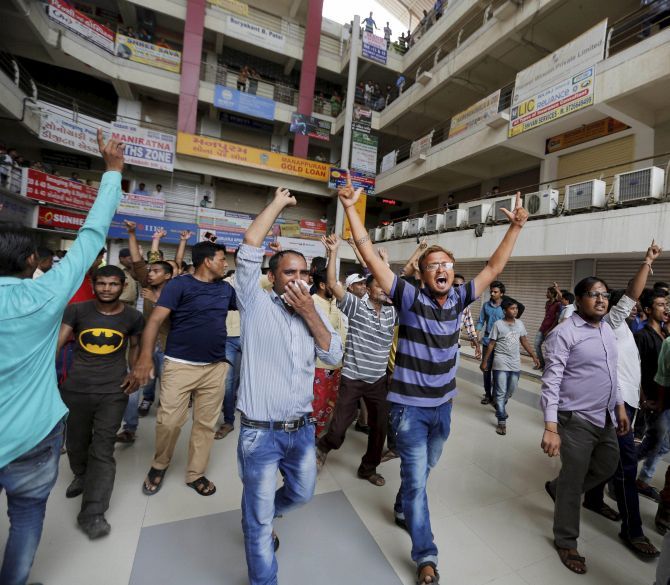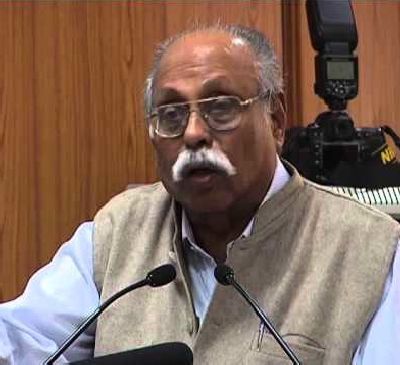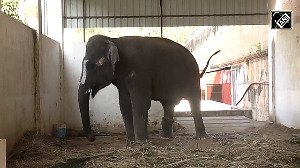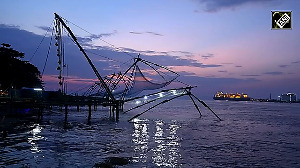
'Only the smoke is coming out now. Let us prevent the lava from coming out by taking proper measures.'
'I have told every leader that you cannot have a stable government without winning the confidence of the scheduled castes, scheduled tribes and the most backward castes.'
'Leaders feel that by giving a sop here and there and by symbolic actions, they can win votes. That's all they want. Votes.'
Though P S Krishnan, 84, retired after three decades of service as an IAS officer in 1990, as the secretary to the Government of India, he continues his work for the socially deprived classes in India.
Krishnan, below, left, has been on numerous government committees after retirement, and is currently the advisor to the government of Telangana on backward classes, and the government of Andhra Pradesh on identification of and reservation for socially and educationally backward classes among Muslims.
He is also a member of the National Monitoring Committee for Education of SCs, STs and Persons with Disabilities, and a member of the Central Monitoring Committee of the National Mission for Empowering Women.
One of the most significant initiatives by him at the national level was the formulation and initialising of the special component plan for scheduled castes in 1978.
When contacted for an interview, he said, "I am ready to talk to anyone on scheduled castes, scheduled tribes and backward classes, as working for them is my mission in life." He spoke to Rediff.com's Shobha Warrier.
You said your fight for the socially deprived class in our society started 65 years ago. What triggered your interest in them?
The turning point, when I look back, was a report I read in a daily newspaper about what Babasaheb Ambedkar said: That one in every seven Indians was an untouchable. As an 11 year old, I could not understand what he meant by 'untouchable.' I thought, how could anybody be untouchable?
As a child, I used to accompany my father every day to the Padmanabha Swamy temple (in Thiruvanathapuram) and when we walked through the long corridor, I used to ask him many questions and we used to discuss many issues.
The day I read the report, I asked him, 'Why does Ambedkar say that one in every seven Indians is an untouchable?' My father explained very honestly about the conditions of untouchables in India. I asked him, 'Is it not unjust?' He said, 'Yes, it is.'
What kind of impact did the revelation have on you?
When I read the newspaper report, it puzzled me. When my father explained it to me, I understood what it was. It shocked me and I could not accept it.
That day, I decidedly went over to the side that suffered, and my place became there. I continued to be on that side even today.
What could you do for them after you joined the IAS?
Even before I joined the IAS, as a student and later on as a teacher, I tried to do whatever was possible to break the caste barriers. As a lecturer, when I put across these ideas to my students, all of them were responsive; not one student was against the idea of ending inequality in society.
I joined the IAS in 1956. From the beginning of my career itself, I took up the issue of scheduled castes, scheduled tribes, backward castes, nomadic communities, scavengers, etc. I used to camp only in the localities where Dalits, scheduled castes and scheduled tribes lived when I went on tour to villages.
I gave importance to land and house distribution to scheduled castes. These two became a part of my everyday life apart from opposing untouchability and any crime committed against them.
Sixty years have passed since you joined the IAS and you have seen first hand the situation they were in then. Do you think changes have taken place in our society in the last six decades? If so, how much has it changed?
There are changes, which I would call quantitative, but changes I would call qualitative, are not yet to be achieved.
Scheduled castes continue to be agricultural labourers and they continue to be the bulk of the landless. If they move to the cities, they continue to be urban unorganised labourers.
Untouchability continues to be practised. Atrocities are being committed on them.
The changes that are essential for their emancipation have not happened. For example, all scheduled castes should have viable agricultural land and this land should have irrigation through combined, joined tube wells or bore wells.
This also applies to scheduled tribes also though they are not landless. They are people with land, but their lands are being grabbed even now.
Unlike the scheduled castes for whom ownership of land was prohibited from one end of the country to the other, scheduled tribes are people with land.
 What is more important for their emancipation, owning land or getting education?
What is more important for their emancipation, owning land or getting education?
Both are extremely important. It is not one or the other. Nobody can touch them if they have a viable irrigated land in a village.
So for dignity, security, and resistance to untouchability, ownership of land is important while education is required for advancement.
If you have irrigated land, you get the wherewithal to educate your children. When you don't have this, you have to fall back on child labour as they are also required to contribute to the family income.
But once they get some income through irrigated land, their children will be free to pursue education.
Is the Dalit agitation we see in Gujarat as a result of years of suppression that has reached a boiling point?
This is not only a matter of Gujarat, it is a matter of all of India.
There is no state which can say we have succeeded in eliminating the indignities and deprivations on Dalits, Adivasis and the backward castes.
Even in Kerala?
Yes, even in Kerala. If you take the scheduled castes of Kerala, the old type of untouchability has largely disappeared like once they were asked not to wear clothes, footwear, etc.
This happened thanks to the efforts of leaders unknown to the world like Ayyankali, Karuppan Master, Narayana Guru who is a little more known unlike Ayyankali.
These are all great people who without any expectations in return, fought against these indignities and mobilised Dalits and backward castes in those days, as a result of which the old type of untouchability has largely disappeared. But it still exists in those parts of Kerala which adjoin Tamil Nadu and Karnataka.
But the consequences of untouchability like low level of education, low ownership of land, high presence in unorganised labour still continue to haunt the scheduled castes, the scheduled tribes and fisherfolk in Kerala.
Do you feel banning beef and cow slaughter acted as triggers for the outburst we see in Gujarat now?
Atrocities against scheduled castes have been going on for a long time. When Dr Ambedkar appeared before the Simon Commission, he gave a graphic description of the atrocities perpetrated on the scheduled castes. So, it is not a new thing.
After Independence, there was this notorious Ramnad riots in 1957 which most people in India today have not even heard of. Then there was this Keezhvenmani atrocities in Tamil Nadu in 1968 where 62 people were burnt to death, mostly women and children.
There were a series of atrocities in Bihar, Uttar Pradesh, Gujarat, and many other places in various states. A scheduled caste boy was burnt to death as he had the temerity to sing during Garba.
Atrocities are an unfortunate part of our otherwise great civilisation. Ours is a great civilisation, but this is a dark spot.
Periyar started the Dravidian movement in Tamil Nadu. It is the most literate state after Kerala, but you have discrimination based on caste even today. Dalits are not allowed inside temples and honour killings happen in villages.
All social revolutions move up to a point and then stop. As soon as a particular class or caste reaches a certain level, they do not want the people below them to come up.
The Tamil Nadu social revolution brought the backward castes up and once they reached the top, they start treating the Dalits the same way they were treated by the upper castes.
The caste virus is virulent and it damages the minds of even good people. Even normal good people behave in a criminal way in the caste context vis a vis the Dalits and other lower castes.
That's why the caste system has to be annihilated, which was one of the goals of Ambedkar.
Do you blame Hinduism for discrimination against Dalits in Indian society?
This is perpetrated by those who do not understand religion. The Upanishads talk of the universal soul permeating all. How can there be untouchability then?
So I don't blame any religion for this; society is to blame. Even in Muslim and Christian society, there is inequality.
The Dalit agitation has been going on for many years. Even the Buddhist movement was strengthened by the scheduled castes.
There were many saint reformers in medieval India. In the 13th century, there was a great man called Basaweswara who broke rules and encouraged the marriage between his sister and an untouchable. Nobody knows about him in India except in Karnataka and his followers have become Lingayats, another caste.
There was a saint called Shankar Dev in Assam who brought tribals to the mainstream society. These counter narratives against the caste narratives are unfortunately not known.
You mean the Dalit movement we see today is not new, but a continuation of what had happened.
It is a continuation of many movements that had happened even before Independence. You saw the nationalist movement, the Communist movement, the socialist movement and then the Ambedkar movement. We also saw many movements in different states like Narayana Guru in Kerala, Periyar in Tamil Nadu, etc.
After this, the scheduled castes began to slowly organise, began to resist. In Kerala, Ezhavas were untouchables then and they could not just enter temples they were not allowed to walk around the outer walls of the temples.
The Vaikom satyagraha was not about entering the temple, it was about the rights of the untouchables led by Ezhavas for the right to walk on the road surrounding the outer wall of the temple.
All these movements and later on with education, Ezhavas came out of the situation they were in.
Don't you think we need political leaders who are visionaries, who understand history as well as society to douse the fire?
Over the years, I have written letters to all the leaders including P Chidambaram, Dr Manmohan Singh, Amit Shah, and Narendra Modi. I have not spared any leader. Only if they read will they understand.
I have explained why and what special measures are required for scheduled castes, scheduled tribes and backward castes and the justifications for them.
I have taught like a teacher, but no student was willing to learn. They feel that by giving a sop here and there and by symbolic actions, they can win votes. That's all they want. Votes.
Is it lack of understanding of a social problem or lack of political will?
Indian political parties without any exception are dominated by upper castes. There are political leaders who themselves grab the land of scheduled tribes. How do you expect them to work for the same people?
I am not talking in general terms, I know the individuals and what they did, I know the harm they have done to scheduled castes and scheduled tribes.
Domination of political parties by the same castes that dominate society has not helped the cause in any way. Not all people behave like this, but those who are doing this are from the upper castes.
Irrigated land distribution and universal education are the two most important things to be done. Both these were there in the UPA (United Progressive Alliance)'s common minimum programme on my efforts, but the government did not do anything on this.
Not only in the CMP, it was there in the Presidential address to the joint session of Parliament in 2004 too. The President saying in Parliament and not doing it is the most undemocratic and unConstitutional thing.
Next are pre-school education through anganvadis and reservation in residential schools of high quality. Money was provided for such schools throughout the country through my efforts in 2006, but the then finance minister did not allow it to happen. Otherwise, we would have had schools in every district.
Unfortunately, the goal of politicians is only to get votes and not work for society. Getting votes has become an addiction for politicians.
The Maharaja of Kolhapur in 1902 started reservations based on caste. Do you feel even after 70 years of Independence, it has not achieved its purpose?
Reservation is not the single medicine, which will cure all the diseases.
In Malayalam, there is this word, Ottamooli, reservation is not an Ottamooli. . You require an array of instruments of which reservation is just one.
Do you feel some people continue to enjoy the fruits of reservation by not allowing those behind them to get it?
This is a canard used by the upper castes. The psychology of the upper castes is to blame the sufferers.
You first provide them land and education and stop blaming those who have benefitted from reservation.
Will there be any difference if leaders from the scheduled castes, scheduled tribes and backward castes lead major political parties?
The problem is who will allow them to lead a major political party?
If I am the leader today, I want my son or daughter to be the next leader, that's what we see today. Why should I allow a (former Bharatiya Janata Party president) Bangaru Laxman to come in?
You knew him very well...
He was a very good person and understood these issues. He was one of those rare politicians who knew a south Indian language as well as Hindi. In my opinion, he didn't deserve what happened to him.
But the truth is no party will give its high position to a backward caste person. When Narasimha Rao was there, he tried to have an election for the Congress Working Committee and even the most popular scheduled caste person could not get enough votes to get in.
Do you feel had Bangaru Laxman been the BJP president now, he would have handled the Dalit agitation differently?
It is a hypothetical question. The scheduled caste people in both the BJP and the Congress have been raising their concern for a long time. Even now, they are talking about the consequences if the issue is not resolved satisfactorily. They are talking about the political consequences, but I am not worried about that.
I am worried because the country needs stability. I have told every leader that you cannot have a stable government without winning the confidence of the scheduled castes and scheduled tribes and the most backward castes.
Getting their confidence is not through giving them some posts, but working for their total rise.
The Congress lost because they didn't attend to their problems. I am not saying they didn't do anything, they did some good things.
Do you think the Dalit agitation in Gujarat will spread to the rest of India?
What you see is a great social movement in Indian society.
The unprecedented mobilisation of the scheduled castes has reached such a level now that those who are blind till now can see it. Those who didn't want to write anything on these matters are writing now.
The upper castes in India and the media never noticed this till now, and now they are noticing it. They are noticing now because Dalits have learnt to mobilise.
This will not end and the fire cannot be extinguished. This will become a national mobilisation unless those who are heading various political parties and those who are at the top of society, mostly belonging to the upper castes and to a limited extent the upper-middle castes, realise that you are sitting on a volcano about which Ambedkar had warned in 1949 after completing the Constitution making task.
You feel an eruption of the volcano is what we are seeing in Gujarat?
Only the smoke is coming out now. Let us prevent the lava from coming out by taking proper measures.
We have to recognise that a great injustice has been done to our own people who are of our own race, and that we have been so cruel to them.
We should apologise and then join them in this effort to help them be equal in all the parameters of life which the upper castes of society enjoy.










 © 2025
© 2025